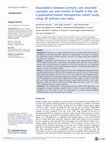Academic research by Juste Abramovaite
British Journal of Criminology, 2019
England and Wales have some of the highest incarceration rates in the developed world. Recent pol... more England and Wales have some of the highest incarceration rates in the developed world. Recent policy reforms have focused on developing alternatives to custody that offer credible protection for the public, and justice for victims of crime. This paper uses unique detailed panel-level data acquired from the Ministry of Justice for all Police Force Areas from 2002 to 2013 in England and Wales to analyse the effects of custodial and non-custodial sentences on recorded crime. Our results suggest that non-custodial sentences can be an effective alternative to custody at reducing property crime but their effect is less consistent for violent crime. This suggests that non-custodial sentences are credible, cost-effective substitutes to incarceration.
Opinion pieces by Juste Abramovaite
LSE British Politics and Policy blog, 2019
Nick Cowen, Siddhartha Bandyopadhyay, and Juste Abramovaite analyse the effects of custodial and ... more Nick Cowen, Siddhartha Bandyopadhyay, and Juste Abramovaite analyse the effects of custodial and non-custodial sentences on recorded crime in England and Wales. Their results suggest that non-custodial sentences can be an effective alternative to custody when it comes to reducing property crime but their effect is less consistent when looking at violent crime.
Papers by Juste Abramovaite

European Journal of Criminology
The severity, certainty and celerity (swiftness) of punishment are theorised to influence offendi... more The severity, certainty and celerity (swiftness) of punishment are theorised to influence offending through deterrence. Yet celerity is rarely included in empirical studies of criminal activity and the three deterrence factors have never been analysed in one empirical model. We address this gap with an analysis using unique panel data of recorded theft, burglary and violence against the person for 41 Police Force Areas in England and Wales using variables that capture these three theorised factors of deterrence. We find that the three factors affect crime in different ways. Increased detection by the police (certainty) is associated with reduced theft and burglary but not violence. We find that variation in the celerity of sanction has a significant impact on theft offences but not on burglary or violence offences. Increased average prison sentences (severity) reduce burglary only. We account for these results in terms of data challenges and the likely different motivations underlyi...

Journal of Interdisciplinary Economics, 2015
The intergenerational cycle of violence hypothesis (often summarily described as ‘violence begets... more The intergenerational cycle of violence hypothesis (often summarily described as ‘violence begets violence’) refers to assumptions or hypotheses about the consequences of child abuse and neglect in relation to a number of different outcomes, including its perpetuation across generations. This article reviews some of the channels by which this cycle of abuse can be perpetuated and suggests that this may occur without any genetic link. A mechanism for such transmission is suggested. It also critically analyzes the empirical literature and the implications of incorrectly identifying an intergenerational transmission mechanism. While the majority of the empirical papers find evidence of the intergenerational cycle, a large number of them do not control for endogeneity or have other methodological flaws. It discusses evidence on effectiveness of policies and concludes by pointing out the need for careful design to correctly capture the underlying relationship between experiencing childho...

Psychological Medicine
Background Cannabis use is a global public health issue associated with increased risks of develo... more Background Cannabis use is a global public health issue associated with increased risks of developing mental health disorders, especially in young people. We aimed to investigate the relationships between cannabis exposure and risks of receiving mental illness diagnoses or treatment as outcomes. Methods A population based, retrospective, open cohort study using patients recorded in ‘IQVIA medical research data’, a UK primary care database. Read codes were used to confirm patients with recorded exposure to cannabis use who were matched up to two unexposed patients. We examined the risk of developing three categories of mental ill health: depression, anxiety or serious mental illness (SMI). Results At study entry, the exposed cohort had an increased likelihood of having experienced mental ill health [odds ratio (OR) 4.13; 95% confidence interval (CI) 3.99–4.27] and mental ill health-related prescription (OR 2.95; 95% CI 2.86–3.05) compared to the unexposed group. During the study peri...











Uploads
Academic research by Juste Abramovaite
Opinion pieces by Juste Abramovaite
Papers by Juste Abramovaite